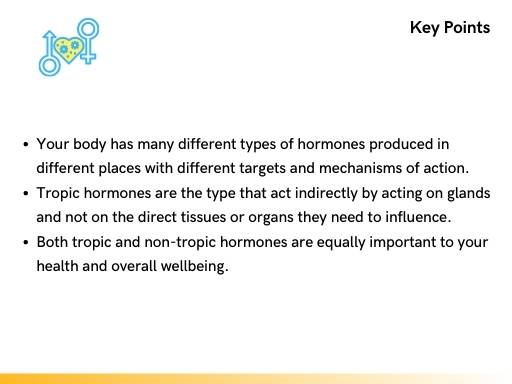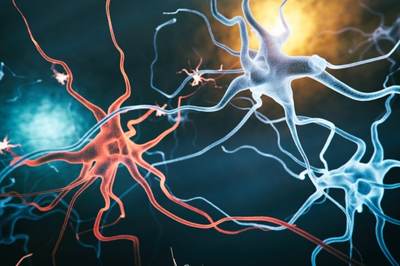 Your body produces several different kinds of hormones. All of your hormones stimulate or regality almost all of your body’s most crucial biological functions, from growth to reproduction.
Your body produces several different kinds of hormones. All of your hormones stimulate or regality almost all of your body’s most crucial biological functions, from growth to reproduction.
The hormones produced by your body consist of 2 distinct compounds: tropic hormones and non-tropic hormones. The two types are distinguished by the way they interact with their target organs or tissues. Tropic hormones operate by first stimulating other glands to produce and release another hormone, and that hormone then, in turn, enters the bloodstream to travel to and interacts with its target. Non-tropic hormones, on the other hand, interact directly with specialized receptors on the outer surface of the cells of their target tissues; there is no intermediary.
Definition of Tropic Hormones
Tropic hormones are those that chemically communicate with the other glands telling them how much of a given hormone to produce or release. Thus, tropic hormones act as intermediaries telling other hormones what to do.
Tropic hormones are also what is known as “peptide hormones,” as opposed to lipid hormones or amine hormones -these are other ways to describe hormones. These terms relate to their chemical structure, such as peptide chains and their solubility or ability to permeate a cell membrane.
Peptide hormones are composed of amino acids. The specific order and configuration of the amino acids will determine the nature of the hormone, its molecular structure, and its chemical properties.
Since amino acids can be arranged in countless numbers of chains, each tropic hormone is a specific result of protein synthesis and is chemically unique, and will only react with the specific receptors of its target gland.
Where Do Trophic Hormones Come From?
Tropic hormones are mainly made and secreted by the hypothalamus and anterior pituitary gland. The thyroid gland also makes and releases a specific hormone known as thyroxin. Therefore, the thyroid is also a source of tropic hormones.
There are some hormones, such as human growth hormone, or HGH, that can have both tropic and non-tropic effects.
After they are released from their source of origin, tropic hormones influence the many glands of the endocrine system. Tropic hormones are the intermediary or “liaison” between the glands of the endocrine system and the bodily systems that they target. It is the tropic hormones that tell the other glands how much of their hormones to produce and when to release them.
What Processes Do Tropic Hormones Regulate?
 Tropic hormones are involved in the stimulation and release of other hormones that are involved in other important biological processes, such as:
Tropic hormones are involved in the stimulation and release of other hormones that are involved in other important biological processes, such as:
- Growth
- Sexual health and fertility
- Temperature regulation
- Controlling systemic inflammation and immune health
- Stress response
- Skin health and protection from sun damage
Some Examples of Tropic hormones
Thyrotropin, also known as Thyroid-stimulating hormone or TSH
Thyrotropin, or TSH, tells your thyroid to produce and secrete release thyroid hormone. Thyrotropin regulates the levels of thyroid hormones, thyroxine and triiodothyronine, by influencing specialized receptors in the thyroid gland. Thyroxine and triiodothyronine are essential to maintaining the body’s metabolic rate, heart, and digestive functions, muscle control, brain development, and maintenance of bones.
Melanotropin
Melanotropin, more commonly known as melanocyte-stimulating hormone, is among the group of hormones that stimulate the production of the pigment melanin in the skin. Melanin is your primary protection from the cancer-causing UV rays in sunlight.
Growth Hormone (HGH)
Human growth hormone, or HGH, is quite intriguing because it is one of a select few hormones that can exhibit both “tropic” and non-tropic effects. The primary purpose of HGH is to stimulate and regulate growth; however, it does this via both tropic and non-tropic mechanisms. Growth hormone’s major tropic effect is to stimulate the release of insulin-like growth factors (IGFs) from the liver, which causes bone growth. Growth hormone also stimulates a number of tissues directly through non-tropic mechanisms to affect metabolism and raise blood glucose levels. HGH also has the non-tropic properties of directly influencing muscle and bone growth.
Corticotropin
The hypothalamus controls the release of hormones from the anterior pituitary by secreting a class of hypothalamic neurohormones called “corticotropin” or, more technically correct, Corticotropin-Releasing Hormone. Corticotropin-releasing hormone signals to the anterior pituitary to release adrenocorticotropic hormone (ACTH). Corticotropin there for is involved in your stress response and the release of the “stress hormone,” cortisol. ACTH binds to its receptor on the adrenal cortex and triggers the release of stress hormones such as cortisol.
Why Are Tropic Hormones Important for Your Health?
 Tropic hormones are important because all of the hormones of your body must work together in concert. If the level of any one of them is off, hormone imbalances occur, which can have drastic health consequences. Since tropic hormones influence or regulate the production and release of many other hormones, they are essential to keeping your hormone levels in proper balance, a biological state known as homeostasis. At homeostasis, you are experiencing optimal health and wellness.
Tropic hormones are important because all of the hormones of your body must work together in concert. If the level of any one of them is off, hormone imbalances occur, which can have drastic health consequences. Since tropic hormones influence or regulate the production and release of many other hormones, they are essential to keeping your hormone levels in proper balance, a biological state known as homeostasis. At homeostasis, you are experiencing optimal health and wellness.
However, when things are off, and you have too much or too little of a given tropic or non-tropic hormone, all sorts of health problems, from lack of energy to sexual health issues, can occur. While there are some adverse conditions that can occur from too much of a given hormone, hormone imbalances caused by low levels of vital hormones are the far more common problem.
Maintaining homeostasis for good health is especially important as we get older. As both men and women age, critical hormone levels drop, causing age-related hormone decline, or age-related hormone deficiency.
The levels of both tropic and non-tropic hormones drop in men and women once they are between the ages of 40 and 65. This can lead to thyroid issues, and the familiar debilitating symptoms of menopause in women and low testosterone or andropause in men.
The depletion of these and other hormones can cause a hormone imbalance that often results in many of the conditions that we think of as “growing older.”
Age-related hormone loss can be effectively treated with hormone replacement therapy. Hormone replacement therapy is the only clinically proven method to treat, slow, and in many cases, eliminate the many incapacitating symptoms of age-related hormone imbalance.
Conclusion
Hormones are your body’s most important chemical messengers, and of those, tropic hormones are so important because they are the intermediaries. Think of them as a mail or UPS truck. That truck may be carrying a super-critical package or letter vital to you – but no matter how important it is – it would never get to you without the truck.
Tropic hormones play the same role in your body. They may not be the hormones that directly stimulate a vital organic process like glucose absorption or fat metabolism, but without their intermediary actions, none of the vital processes regulated by the other glands could take place.

